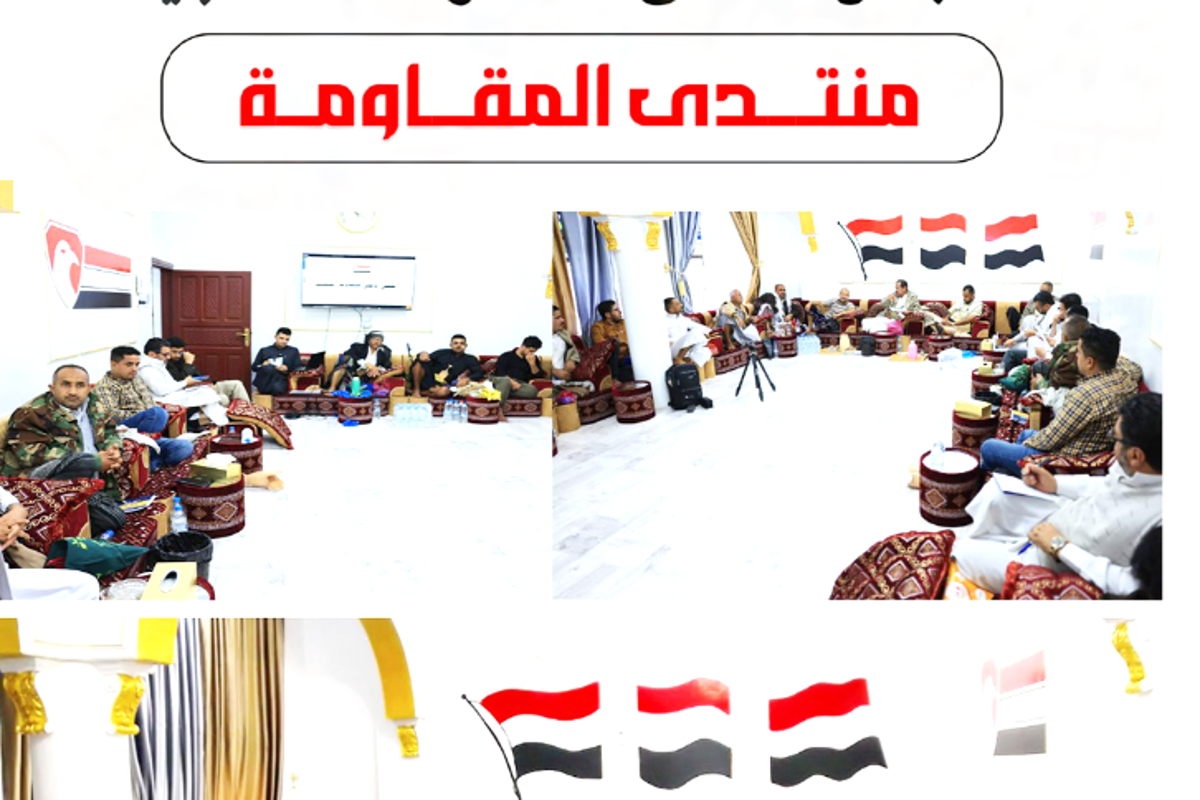Leaders and Politicians: Popular Resistance is the Way to Salvation from the Tribal Coup
2024-12-28
During the Weekly Resistance Forum
Leaders and Politicians: Popular Resistance is the Way to Salvation from the Tribal Coup
Taiz: Special
Working papers and speeches delivered at the weekly resistance forum affirmed that popular resistance is the only way to save the Yemeni people from the clutches of tribal enslavement and to restore the state and rebuild it in accordance with the outcomes of the comprehensive national dialogue, which Yemenis agreed upon as a viable solution to all their problems and suffering.
A leading figure in the popular resistance, A. Saeed Sultan, stated in a paper presented at the weekly forum held at the headquarters of the Supreme Council of Popular Resistance in Taiz that the duty of the time and the stage requires resistance men to study what can be benefited from for the benefit of the national battle.
He stressed the need to unify the ranks in all political, media, and combat doctrinal fields, as well as to unify military leadership and resources dedicated to the battle.
For his part, Brigadier General Saad al-Yousfi, a leader in the National Army, affirmed in his speech that readiness is important in all circumstances, and that full preparedness and continuous mobilization are among the reasons for victory.
Al-Yousfi added that we must unify the ranks, unify the decision and leadership, and possess the religious dimension and belief in the cause and its justice, and the clear project that enjoys the support of the Yemeni people, and our just cause is an indicator of victory.
Meanwhile, the political leader A. Abdullah Hassan Khaled said in his paper that there is a favorable military and political circumstance as a result of Iran's defeat with the fall of its tools like autumn leaves, in addition to the Houthis' harvest of global Arab and local anger, and this provided an opportunity for Yemenis to get rid of the Houthis and restore the state, homeland, and freedoms, and the resistance must seize this opportunity before it is gone.
The leader Abdullah pointed out that the popular resistance is a necessary choice because it is popular and free from any agreements or policies that lead the country and people to ruin, stressing the need for everyone to reach a guarantee of unity of ranks, leadership, the method of struggle, and the media discourse.
The spokesman for the National Army in Taiz, Colonel Abdul Basit al-Bahri, indicated in his paper, "The Inevitability of Resistance," the importance of the role of popular resistance in restoring the state and its institutions, eliminating rebellion and coup, preserving the Yemeni people's beliefs, identity, and authentic Arab Islamic Yemeni culture, and its homogeneous social fabric, its national dignity, its republican, democratic, and just system, and removing all differences and privileges between classes and enhancing the values of equal citizenship, justice, consultation, freedom, and human dignity.
Al-Bahri affirmed that resistance is the basic means through which peoples can regain their rights and freedoms when they are taken away from them. Noting that in Yemen, where the Houthi Imamate coup took place, resistance is a means of preserving freedom and democracy and rejecting tyranny and despotism.
He added that resistance contributes to preserving national identity and cultural specificity in the face of any attempts at forced change or erasure of identity. Noting that in the case of Yemen, resistance against the Houthis comes within the context of defending the modern civil state that the people have established throughout their history and the gains of their struggle, as expressed in the outcomes of the comprehensive national dialogue.
He considered resistance a unifying factor for the Yemeni people, as it strengthens ties between its various components, whether regional, ethnic, or political, and it also enhances the idea that Yemen should be one free and independent state, away from the divisions that some seek to impose. Adding that "the resistance is the only unified, cohesive, and integrated entity in all parts of Yemen like one body in all governorates."
He stressed that resistance is important in liberating from domination, stopping tyranny and Houthi occupation, restoring state institutions, protecting the Yemeni people from violations, protecting the future of future generations, and confronting the Houthi expansionist project.
Colonel al-Bahri concluded his paper by affirming that popular resistance in Yemen is a necessity, a religious duty, and a fundamental basis for salvation and liberation from Houthi domination, restoring the state, and ending rebellion and coup.
The forum witnessed rich interventions and discussions on the part of the attendees, who stressed the importance of raising public awareness of the national battle and the danger of the Houthi militia, affirming that popular resistance represents the will of the people and is the best way to get rid of the coup militia.
